-
 Art of Wellness Acupuncture & Traditional Chinese Medicine (TCM)11704 Wilshire Blvd, Suite 295, Los Angeles, CA, 90025
Art of Wellness Acupuncture & Traditional Chinese Medicine (TCM)11704 Wilshire Blvd, Suite 295, Los Angeles, CA, 90025
myartofwellness@gmail.com310-451-5522 Office Hours
MonClosedTue7:30 am --4 pmWed7:30 am --4 pmThu7:30 am -- 4 pmFri7:30 am -- 4 pmSat7:30 am -- 4 pmSunClosedOur office opens from Tuesdays to Saturdays 7:30 am to 4 pm, will be closed on Memorial day, Independent day, Labor day, Thanksgiving day, Christmas and New year.
-
Recent Posts
- How to Treat Nerve Pain With Acupuncture and TCM
- How to Treat Watery Eyes With Acupuncture and TCM
- How to Treat Ovarian Cysts With Acupuncture and TCM
- How to Treat Dystonia With Acupuncture and TCM
- Can Acupuncture Help Bad Breath?
- How to Treat Atopy with Acupuncture and TCM
- Plantar Fasciosis Treatment With Acupuncture and TCM
- How to Protect Yourself When Air Quality Is Poor
- How to Treat Spinal Headache With Acupuncture and TCM
- How to Treat Sarcoidosis With Acupuncture and TCM
- How to Treat Flu With Acupuncture and TCM
- Chinese New Year 2025 Year of the Snake
- How to Treat Lumbar Stenosis With Acupuncture and TCM
- How to Treat Wrist Pain With Acupuncture and TCM
- How to Treat Cervical Radiculopathy With Acupuncture and TCM
- How To Treat Frozen Shoulder With Acupuncture and TCM
- Sign up to receive news and updates and get my free report:“The Top 10 Reasons to Try Acupuncture”

May 2025 M T W T F S S 1 2 3 4 5 6 7 8 9 10 11 12 13 14 15 16 17 18 19 20 21 22 23 24 25 26 27 28 29 30 31
pregnancy care
How to Treat Pelvic Congestion Syndrome With Acupuncture and TCM
By Xiaomei Cai, L.Ac., Ph.D. and Qineng Tan, L.Ac., Ph.D.
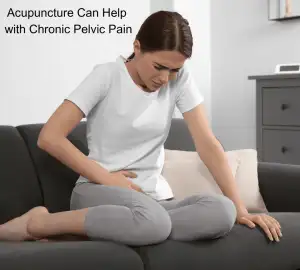
Pelvic pain that gets worse after standing for a long time? Urinary pain and urgency? Lower back pain and sciatica? Bloated stomach after eating? These can all be symptoms of pelvic congestion syndrome (PCS), or vaginal varicose veins. Acupuncture and TCM offer an alternative treatment for pelvic congestion syndrome.
What is Pelvic Congestion Syndrome (PCS)?
Pelvic Congestion Syndrome (PCS) is a chronic condition caused by varicose veins in the pelvis—similar to varicose veins that commonly occur in the legs. These dilated veins in the pelvis can cause severe pelvic pain, particularly a feeling of heaviness or aching pain that worsens over the day. PCS pain can often get worse after standing for long periods.
Pelvic congestion is one of the most common causes of chronic pelvic pain, but PCS often goes undiagnosed because the symptoms can mimic other conditions, such as:
- Endometriosis
- uterine fibroids/leiomyoma of the uterus
- bladder pain/interstitial cystitis
- ovarian cysts
- Generalized back pain, lower back pain, hip pain, or groin pain
All of these conditions can cause chronic pain in the pelvic area.
In Pelvic Congestion Syndrome, dilated veins around the ovaries and the vulvovaginal can happen due to venous obstruction, problems with valves in the blood vessels, and/or changes in hormone levels.
PCS does not only affect women. Men can also suffer from pelvic congestion syndrome and experience chronic pelvic pain.
Pelvic pain conditions related to vascular issues and blood flow are complicated. Most health conditions related to pelvic pain in relation to reproductive organs, and in particular CPS, are still not very well understood by modern medicine.
TCM offers a holistic approach to reproductive healthcare. Acupuncture treatment can help address the many factors involved in pelvic congestion syndrome.
Top 10 Pelvic Congestion Syndrome Symptoms
PCS symptoms can vary from patient to patient, but the most common signs of PCS include:
- Pelvic pain that gets worse as the day goes on. Discomfort tends to accumulate as the day progresses due to the pooling of blood in the pelvic veins, leading to increased pressure.
- Pelvic pain that worsens when standing for long periods. Many women report that standing for extended periods increases the feeling of pressure and pain in the pelvic region.
- Pelvic pain after eating, abdominal pain after meals. Eating can trigger pain and bloating, making meals uncomfortable.
- Urinary incontinence, an inability to control urination, especially when coughing or lifting something heavy.
- Painful urination (urinary pain),burning during urination, often confused with a UTI (urinary tract infection).
- Urinary urgency, sudden need to urinate, sudden, intense urge to urinate, which can feel similar to bladder conditions.
- IBS symptoms, alternating constipation and diarrhea, bloating, and abdominal pain.
- Lower back pain, radiating pain in the lower back, often mistaken for sciatica or musculoskeletal problems.
- Throbbing in the legs, achy legs after standing for a long time, poor circulation in the lower extremities, causing aching, swelling, and throbbing in the legs.
- Painful intercourse (dyspareunia), pain during or after sex due to the increased pressure and swelling of the pelvic veins.
What Does Pelvic Congestion Pain Feel Like?
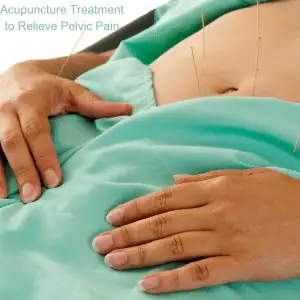
Pelvic Congestion Syndrome (PCS) and Chronic Pelvic Pain Syndrome (CPPS) are two conditions that cause debilitating pain in the pelvic region, yet they are distinct in the way they present.
Pelvic Congestion Syndrome (PCS) is primarily caused by varicose veins in the pelvis, leading to blood pooling in the veins and creating chronic pelvic pain, particularly in women of childbearing age. PCS pain tends to worsen after long periods of standing, physical activity, or after sexual intercourse.
PCS is often associated with hormonal changes and pregnancy, but it is also underdiagnosed because the symptoms can overlap with other pelvic disorders besides pregnancy.
Diagnostic tools like Doppler ultrasound or venography are often needed to identify the underlying venous issues, which may be treated with hormone therapy, vein embolization, or surgery.
Medications that suppress estrogen may be prescribed to help relieve symptoms. These include Depo-Provera, Implanon, or Goserelin. These are all drugs that also prevent pregnancy, so they are not helpful for people who may be hoping to get pregnant, or who want or need to avoid taking hormonal birth control for whatever reason.
Ovarian vein embolization is a procedure that blocks or ties off veins so that blood isn’t flowing or pooling in areas of the pelvis.
Acupuncture offers an natural treatment for pelvic congestion syndrome, without side effects of hormonal birth control.
Can Acupuncture Help Pelvic Congestion Syndrome?
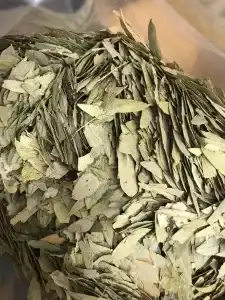
Traditional Chinese Medicine (TCM), particularly acupuncture, can be an effective modality for treating conditions like Pelvic Congestion Syndrome (PCS) and Chronic Pelvic Pain Syndrome (CPPS).
Acupuncture has been widely adopted in both Eastern and Western countries for managing pain syndromes. The central mechanism behind acupuncture’s effectiveness in these cases is its ability to stimulate specific acupoints, improving local blood circulation and reducing inflammation, which ultimately helps in alleviating pain.
The muscles and fascia inside the pelvis play a crucial role in maintaining the stability of the pelvis and spine. The fascia in the pelvis can be compromised by trauma, postural stress, pregnancy, anxiety, and other subtle factors.
This is one of the reasons the pelvic pain and congestion can be difficult for conventional medicine to address properly. Visceral pain in the pelvic may not be easily “visible,” as it can be caused by microtraumas, adhesions, scar tissue, and pain referring from one area to another.
Acupuncture treatment can help relieve this type of pain, as placing needles in acupoints has an analgesic, as well as a calming, effect.
Research has demonstrated that acupuncture can release certain neurochemicals like adenosine, which exerts an analgesic effect during stimulation of acupoints, offering relief from pain in conditions like CPPS. This mechanism helps reduce inflammation and regulate pain by influencing inflammatory mediators, which play a significant role in chronic pelvic pain disorders.
Clinical trials have specifically shown that acupuncture improves symptoms in both men and women suffering from CPPS, with better outcomes than placebo or sham treatments.
One study looked at male patients with pelvic pain and venous congestion. After five weekly sessions of acupuncture treatment, patients reported significant reduction in pain, and MR venography showed reduction in intrapelvic venous congestion.
Specific formulations of Chinese herbs have been developed to help address the root cause of pelvic congestion, while also relieving painful symptoms.
Acupuncture’s ability to relieve pain through modulation of inflammatory processes makes it an excellent alternative or complementary therapy for chronic pelvic pain conditions.
Acupuncture Near Me for PCS in West LA
At Art of Wellness Acupuncture and TCM in Santa Monica, we have over 35 years of experience helping people with all kinds of chronic pain conditions. We offer highly specialized care for people experiencing reproductive issues, pregnancy, pelvic pain, referred back pain, lower back pain, hip pain, and groin pain. Our team of practitioners spend time with each patient to provide holistic care that takes the whole person into account: physical, mental, and emotional. If you or someone you know is experiencing chronic pelvic pain, please do not hesitate to reach out to us.
*This article is for education from the perspective of Traditional Chinese Medicine only. The education provided by this article is not approved by FDA to diagnose, prevent, treat and cure human diseases. It should not stop you from consulting with your physician for your medical conditions. Traditional Chinese Medicine is based on Qi, which is an invisible force that usually cannot be observed by modern science. Because science focuses on testing ideas about the natural world with evidence obtained through observation, these aspects of acupuncture can’t be studied by science. Therefore acupuncture and Chinese herbs are often not supported by double-blind, randomized trials, and they are considered alternative medicine therapies in the United States.
How To Treat Pelvic Pain With Acupuncture and TCM
By Xiaomei Cai, L.Ac., Ph.D. and Qineng Tan, L.Ac., Ph.D.

Abdominal pain or groin pain? Painful urination or menstrual pain? Bloated stomach? Pain during sex or pain after sex? These can be signs of an inflamed pelvis, or chronic pelvic pain syndrome (CPP or CPPS). Acupuncture and TCM offer a way to treat many different causes of pelvic pain.
Pelvic pain is often related to problems with the reproductive organs (uterus or ovaries). Sometimes it can be due to a pelvic infection, pelvic congestion syndrome, or pelvic inflammatory disease. In other cases, chronic pelvic pain can be caused by problems with the digestive tract or urinary system.
Determining the cause of pelvic pain and finding an effective treatment can sometimes be challenging. TCM and acupuncture offer a holistic approach to treating pelvic pain.
Top 10 Causes of Pelvic Pain
Pelvic pain can arise from a multitude of conditions, each presenting its own set of symptoms.
Common causes of occasional or intermittent pelvic pain are menstrual cramps and ovulation pain (mittelschmerz).
Various types of pelvic pain are associated with pregnancy, as well, particularly hip pain, groin pain and pressure, bladder pressure, and uterus pain.
A gallbladder attack can cause severe pelvic pain.
These are some of the most common causes of chronic pelvic pain in women or AFAB:
- Endometriosis: This condition occurs when tissue similar to the lining of the uterus grows outside of the uterus, causing severe menstrual pain, pelvic pain, pain during intercourse, and fertility issues.
- Ovarian Cysts: These fluid-filled sacs can develop on the ovaries, often leading to bloating, pelvic pain, and discomfort during bowel movements.
- Kidney Stones: Hard mineral deposits in the kidneys can cause excruciating pain in the lower abdomen and groin, painful urination, and blood in the urine.
- Uterine Fibroids: These non-cancerous growths in the uterus can cause heavy menstrual bleeding, pelvic pressure or pain, and frequent urination.
- Pelvic Inflammatory Disease (PID): An infection of the female reproductive organs that causes lower abdominal pain, fever, unusual discharge, and pain during intercourse or urination.
- Urinary Tract Infection (UTI): Infections in the urinary system can cause pelvic pain, a burning sensation during urination, frequent urination, and cloudy urine.
- Interstitial Cystitis (IC): A chronic bladder condition causing bladder pressure, pelvic pain, and a frequent need to urinate.
- Diverticulitis: Inflammation or infection of small pouches that can form in the intestines, leading to severe abdominal pain, fever, and digestive issues.
- Colitis: Inflammation of the colon, often causing abdominal pain, diarrhea, and bloating.
- Irritable Bowel Syndrome (IBS): A gastrointestinal disorder that leads to cramping, abdominal pain, bloating, gas, and diarrhea or constipation.
Sometimes pelvic pain can be caused by muscles or ligaments, such as tightness or spasms in the pelvic floor.
Pelvic adhesions, scar tissue, or fascia in the pelvic region can cause pelvic pain and inflammation.
Generalized pain disorders like fibromyalgia or ME/CFS, can flare up in the pelvic area.
For some people, PTSD and other mental health conditions can trigger pelvic pain.
Typically, medical treatment for pelvic pain involves the use of NSAIDs, or pain medication, to help relieve symptoms. Sometimes doctors will prescribe antidepressant medications or opioids to deal with persistent pelvic pain.
In some cases, physical therapy, such as pelvic floor therapy, may be recommended.
TCM and acupuncture offer an effective alternative treatment for pelvic pain.
Can Acupuncture and TCM Help Pelvic Pain?
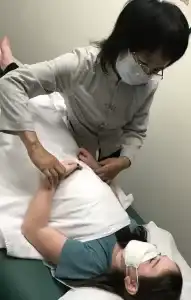
It can be difficult to find relief from pelvic pain. Many conditions that cause pain in the pelvis and reproductive organs are often overlooked by medical practitioners. For example, many women and AFAB suffer for years before finally getting a diagnosis for endometriosis.
Pelvic Pain in Women and AFAB
In Traditional Chinese Medicine (TCM), pelvic pain conditions like endometriosis are viewed as imbalances within the body’s organ systems, particularly the liver and kidney.
Dysmenorrhea, or painful menstruation, is often linked to Qi and blood stagnation, potentially caused by pathogenic factors such as cold and dampness, as well as emotional stress leading to liver stagnation. Acupuncture and herbal treatments aim to restore balance by promoting the flow of Qi and blood, influencing hormone production naturally.
Studies have shown that acupuncture can significantly reduce menstrual pain and regulate cycles, with high success rates and low recurrence when used consistently over time. Herbal remedies further support this process by providing essential nutrients and reducing inflammation.
Acupuncture and TCM have proven effective in treating various pelvic pain conditions, including uterine fibroids and PCOS. Clinical research demonstrates that acupuncture reduces prostaglandin levels, alleviating cramps and regulating the menstrual cycle. Techniques such as electroacupuncture and auricular acupuncture have shown high efficacy in managing dysmenorrhea (painful periods).
Urinary Pain Relief with TCM
In Traditional Chinese Medicine (TCM), the bladder’s function is closely connected to the kidney and spleen, which supply yang energy to warm and support the bladder. Deficiency in Kidney Qi, often due to prolonged illness or repeated untreated urinary tract infections (UTIs), can weaken the bladder, making it unable to hold urine effectively. This can also lead to bladder contraction and increased sensitivity.
Painful urination may arise from physical trauma, such as difficult childbirth, which impacts both physical and emotional health. Additionally, emotional distress can cause stagnation of Liver Qi, particularly if it leads to excess heat, further disrupting bladder and pelvic floor functions.
When treating interstitial cystitis (IC), an acupuncturist assesses a range of symptoms to determine the underlying causes of bladder pain. For example, fatigue, tinnitus, and cold extremities indicate Kidney Yang deficiency, while symptoms like constant thirst, allergies, warm hands, and anxiety suggest excess Kidney Yang heat.
Treatment protocols typically include acupuncture to alleviate bladder pain and balance organ system functions, supplemented by techniques like moxibustion and electro-acupuncture. Studies have shown that regular acupuncture sessions can significantly reduce urinary frequency and alleviate pelvic pain symptoms.
Pelvic Pain Colitis
In TCM, colitis and ulcerative colitis are viewed as conditions caused by imbalances that lead to heat, dampness, or blood stasis in the large intestine. TCM treatments focus on using acupuncture and herbs to reduce inflammation, clear heat, and eliminate dampness. Acupuncture points are selected to relieve symptoms like pain, bloating, and diarrhea.
For diverticulitis, TCM emphasizes diagnosing the root causes of symptoms such as abdominal pain, nausea, constipation, and diarrhea. According to TCM theory, these symptoms can be linked to stagnant Qi or blood and pathogenic forces like dampness, heat, or cold. Treatment often involves strengthening the spleen to improve nutrient absorption and energy conversion, which is crucial for resolving diarrhea and other digestive issues. Acupuncture and moxibustion are used to relieve symptoms, reduce inflammation, and boost immune function. Dietary changes, guided by TCM principles, are also essential to address excess heat or dampness in the gastrointestinal system and maintain overall health.
Pelvic Pain Kidney Stone
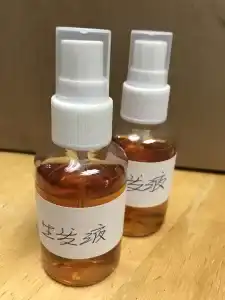
In TCM, kidney stones fall under the category of “Shilin” conditions, characterized by difficult urination. Herbal medicines are used to balance electrolyte minerals, which helps prevent stone formation in the urinary tract.
Acupuncture provides an anesthetic effect, helping to relieve the intense pain associated with kidney stones while other treatments work to reduce and prevent new stone formation. Acupuncture and acupressure can alleviate severe pelvic pain caused by various urinary and reproductive system conditions, as well as reduce anxiety and depression associated with severe pain.
Not only is acupuncture an effective modality for treating pain conditions, but many people find emotional relief, too, when a practitioner is willing to listen carefully and validate their experience. Drs. Cai and Tan at Art of Wellness have over 35 years of experience helping patients with all types of pain. Their caring and attentive bedside manner goes a long way towards helping patients feel more comfortable and confident in their own ability to heal.
Acupuncture for Pelvic Pain Near Me in West Los Angeles
At Art of Wellness near Santa Monica, Dr. Cai has unique expertise in treating women’s health issues of all kinds, including menstrual pain, female infertility, PCOS, and endometriosis. With acupuncture, herbal medicine, and nutrition, our acupuncture practitioners are able to help people find relief from pelvic pain of all kinds.
*This article is for education from the perspective of Traditional Chinese Medicine only. The education provided by this article is not approved by FDA to diagnose, prevent, treat and cure human diseases. It should not stop you from consulting with your physician for your medical conditions. Traditional Chinese Medicine is based on Qi, which is an invisible force that usually cannot be observed by modern science. Because science focuses on testing ideas about the natural world with evidence obtained through observation, these aspects of acupuncture can’t be studied by science. Therefore acupuncture and Chinese herbs are often not supported by double-blind, randomized trials, and they are considered alternative medicine therapies in the United States.
How to Treat Anemia With Acupuncture and TCM
By Qineng Tan, L.Ac., Ph.D & Xiaomei Cai, L.Ac., Ph.D
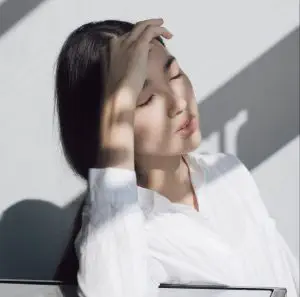
Tired, weak, and pale? These can be symptoms of Anemia. Whether anemia is due to deficiency of iron, or inherited, as with sickle cell anemia or thalassemia, TCM and acupuncture can provide an alternative or adjunct anemia treatment.
Anemia (sometimes spelled ‘anaemia’) is a broad term referring to blood disorders that cause people to either not have enough red blood cells, or to have red blood cells that don’t function properly. Red blood cells are made by the bone marrow, using iron, folic acid, and vitamin B12 as building blocks.
Red blood cells carry hemoglobin to organs and tissues throughout the body. Hemoglobin is a protein that contains iron. Hemoglobin picks up oxygen from the lungs and carries it to the rest of the body. If this process is disrupted, then cells in the body don’t get the oxygen they need.
Top 5 Types of Anemia
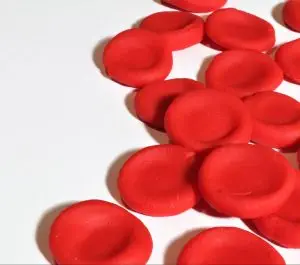
There are many different types of anemia. Some are genetically inherited. Others may manifest due to conditions like pregnancy, an injury, an illness like mononucleosis, or nutritional deficiencies. Some types of anemia are related to autoimmune disorders, such as lupus, Crohn’s, or Celiac disease. Anemia can also be caused by blood loss due to an accident or surgery, or internal bleeding. The most common types of anemia include:
- Sickle cell anemia
- Pernicious anemia
- Iron deficiency anemia
- Thalassemia
- Aplastic anemia
Sickle cell disease is an inherited condition in which some red blood cells form in an unusual shape, like a sickle or crescent. These cells have a harder time moving through the blood vessels, so blood flow can become slow or blocked.
Thalassemia is also inherited. With this condition, the body does not make enough hemoglobin.
Iron deficiency anemia occurs when a person doesn’t have enough iron to nourish their red blood cells, so they have low hemoglobin levels. This type of anemia can happen due to a loss of blood, or because a person’s digestive system isn’t absorbing enough iron from their food. Sometimes people develop this type of anemia during pregnancy, because a lot of iron is going to the growing fetus.
Low levels of Vitamin B12 and/or folate can also cause anemia. Pernicious anemia is a type of autoimmune disorder in which the digestive tract cannot properly absorb vitamin B-12 because immune cells are attacking the lining of the stomach. Megaloblastic anemia is another kind of anemia, where the red blood cells are too large, that happens due to a B12 deficiency, or lack of folate.
People can also develop a form of pernicious anemia after having a gastric bypass or other surgery in which a part of the stomach or small intestine is removed. This inhibits their ability to absorb nutrients during digestion.
Aplastic anemia occurs when the bone marrow cannot produce enough blood cells. Aplastic anemia is rare, but it may happen when a person has gone through chemotherapy or radiation treatment, had a reaction to some toxin or medication, or after a viral infection.
Aplastic anemia can also manifest as an autoimmune disorder, in which the immune system attacks the bone tissue. Fanconi anemia is a genetic condition that also affects the bone marrow’s ability to make red blood cells.
Top 10 Anemia Symptoms
What are the signs that you are anemic? Pallor, or pale skin, weakness and fatigue, dizziness, and headaches are some of the most well-known iron deficiency symptoms.
Other signs of anemia include:
- Fatigue, feeling tired all the time
- Muscle weakness
- Markedly pale skin, pallor, or yellow skin
- Shortness of breath, rapid breathing
- Changes in stool
- Dizziness, light-headed
- Palpitations, rapid heart rate
- Low blood pressure
- Feelings of irritability, anger, frustration, depression, anxiety
- Headaches
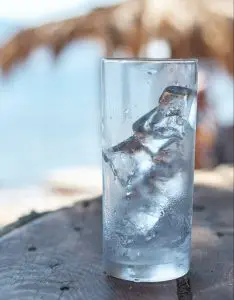
Other signs of low iron can include:
- bruising easily
- pounding or “whooshing” in the ears
- cravings for ice or clay
- brittle nails
- hair loss
- sore tongue
- enlarged spleen
If anemia worsens, low iron symptoms or low hemoglobin symptoms could include:
- fainting, passing out
- whites of the eyes look blue
- chest pain
Treatment for Anemia
Doctors will usually order a CBC test first to check for anemia. This can reveal how many red blood cells you have, and the shape of the cells. Tests can also show B12 and iron levels.
Iron supplements and high iron foods will be recommended. In more severe cases, iron may be supplied intravenously, or with a blood transfusion. Vitamin B12 shots or supplementation of folic acid and Vitamin C may also be recommended.
Genetic types of anemia like sickle cell disease and thalassemia may be treated with a bone marrow transplant.
Autoimmune related anemia, like aplastic anemia, is usually treated with blood transfusions, immunosuppressant medications and steroids, and ultimately, bone marrow transplant, or stem cell transplant.
Anemia is, for the most part, considered a chronic illness that can be managed with additional iron and other nutrients. TCM allows us to look more deeply at the root causes of anemia, and to help increase iron absorption by addressing deficiencies affecting the digestive tract.
Can Acupuncture Help Anemia?
In TCM, we see many conditions as occurring due to a deficiency of Qi (vital energy) and/or blood. Blood deficiency can be the result of excessive blood loss, as after an injury, or due to heavy menstrual bleeding, as when a person has uterine fibroids. It can also happen because the organ systems are not able to perform their roles in the production of blood. Blood stasis, which occurs when blood is not being moved or replaced properly, can also be a factor.
In TCM theory, blood is considered to be governed by the heart, stored in the liver, and produced by the spleen. TCM differentiates different patterns of blood deficiency according to which organ systems seem to be affected:
- Heart blood deficiency: restlessness, difficulty concentrating, memory problems, heart palpitations
- Spleen blood deficiency: weight loss, lack of appetite, mental fatigue
- Liver blood deficiency: irritability, dry, brittle nails, spasms
Acupuncture treatment for anemia may involve, then, using specific acupoints to help strengthen the Qi of the liver, stomach, and/or spleen.
The root cause of anemia is that the digestive tract is not able to absorb nutrients adequately. Acupuncture has been shown in studies to help increase iron absorption in the intestinal tract. In laboratory studies, acupuncture treatment was seen to increase levels of serum ferritin, a protein that carries iron in the blood.
Chinese herbal supplements for anemia can help to remove blood stasis, strengthen the spleen and heart, and provide nourishment for the production of blood cells.
One study showed that TCM herbs helped reduce mortality risk when used as an adjunct or alternative to medical therapies in patients with aplastic anemia.
Acupuncture Near Me for Anemia in Los Angeles and Santa Monica
Anemia can have an impact not only on your energy and physical well-being, but your mental health, as well. TCM treatment for anemia involves a combination of acupuncture, herbs, and nutrition that can help strengthen the process of blood production and transportation throughout the body, while also helping to relieve symptoms like dizziness, fatigue, headaches, and irregular heartbeat. The acupuncturists at Art of Wellness have over 30 years of experience helping patients overcome chronic conditions like anemia.
*This article is for education from the perspective of Traditional Chinese Medicine only. The education provided by this article is not approved by FDA to diagnose, prevent, treat and cure human diseases. It should not stop you from consulting with your physician for your medical conditions. Traditional Chinese Medicine is based on Qi, which is an invisible force that usually cannot be observed by modern science. Because science focuses on testing ideas about the natural world with evidence obtained through observation, these aspects of acupuncture can’t be studied by science. Therefore acupuncture and Chinese herbs are often not supported by double-blind, randomized trials, and they are considered alternative medicine therapies in the United States.
How To Treat Claustrophobia Anxiety Disorder With Acupuncture and TCM
By Xiaomei Cai, L.Ac., Ph.D. & Qineng Tan, L.Ac., Ph.D.
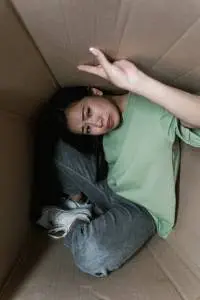
Claustrophobia is a specific kind of anxiety disorder in which fear of being in an enclosed space can bring on symptoms similar to those of panic attacks. Claustrophobic feelings like being anxious, hyperventilating, sweating, shaking, and rapid heartbeat can be eased with acupuncture and TCM.
Claustrophobia is actually quite common; at least 10% of people report experiencing some claustrophobic feelings. Women report having a fear of confined spaces more often than men do. Phobias are sometimes rooted in a childhood experience, but they can arise in anyone, at any age, and are considered mental health issues or psychiatric disorders.
Phobias are distinct from regular fears because of their intensity and, to some extent, irrational nature. Phobias are unreasonable fears; feeling very afraid, to the point of physical and emotional distress, of something that isn’t really happening. Claustrophobia becomes a serious mental health problem if it interferes with a person’s daily life or relationships.
Sometimes claustrophobia can get in the way of a person getting help for other health problems. For example, it may cause them to avoid undergoing an MRI. Some people might fear visiting a doctor’s office, which often means facing elevators, public restrooms, and other small rooms without windows. Some women report feeling claustrophobic during pregnancy, as if they are “trapped” inside their own bodies.
Other common triggers of claustrophobia include: airplanes, trains, tunnels, small cars, revolving doors, or amusement park rides with restraints. Even thoughts of having to be trapped in one of these situations can be enough to bring on symptoms of claustrophobia. Signs of claustrophobia can be similar to those of a panic attack.
Top 10 Symptoms of Claustrophobia:
- Sweating
- Shaking or trembling
- Trouble breathing
- Rapid heartbeat, fast heart rate, high blood pressure
- Tight feeling in chest, chest pain
- Flushed face, feeling hot
- Dizziness, feeling lightheaded or faint
- Ringing in ears, tinnitus
- Butterflies in stomach feeling, nausea, queasy feeling
- Numbness or tingling in parts of the body
Other signs of anxiety due to claustrophobia could include: dry mouth, difficulty swallowing, choking, chills, confusion, or disorientation. In addition to physical symptoms of panic, claustrophobia may cause a person to cry, yell, or to be overwhelmed by a desire to get out of a situation because they feel that they are in serious danger, even if it seems irrational.
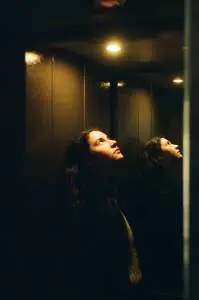
Cleithrophobia is another type of anxiety disorder that is sometimes confused with claustrophobia. Cleithrophobia specifically refers to the fear of being trapped or confined with no way to escape. Claustrophobia is a fear of the small space itself. These two phobias can exist together. Either one could cause serious anticipatory anxiety, for example, if a person has to have an MRI.
Cleithrophobia is related to other “winter phobias,” which may include “cabin fever,” which is a sense that one is stuck inside, or a fear of being literally trapped in the ice or snow. Many people feel an extra sense of sadness or dread during the winter months; this kind of depression is known as SAD (seasonal affective disorder).
Over time, repeated panic attacks or bouts of intense anxiety brought on by claustrophobia can create long-term stress that is harmful to overall physical and mental health. Acupuncture and TCM offer an adjunct or alternative treatment for claustrophobia which can help reduce symptoms and offset the effects of stress.
What Causes Claustrophobia?
Phobias can be triggered by some event or experience in which a person felt endangered and was traumatized, similar to PTSD (post-traumatic stress disorder). Like other mental health conditions, claustrophobia is influenced by brain chemistry. Imbalances in the neurotransmitters in the brain can cause some people to experience symptoms of anxiety or panic attacks even if nothing scary is really happening. Then, they may associate those physical and emotional feelings with a specific place or situation, which causes the anxiety to be triggered whenever they approach that place or even think of that situation.
People can perceive things differently. One research study suggested that people with claustrophobia may have a different perception of how near something, like a wall, is to them. In other words, they underestimate distances, or their sense of “personal space” is different from other people’s.
The amygdala is the part of the brain that processes incoming sensory information from the environment and signals the autonomous nervous system if it detects danger. This is essentially the neurological pathway of fear. Some research has suggested that people who experience panic disorders are more likely to have a smaller-than-average amygdala.
Treatment for Claustrophobia
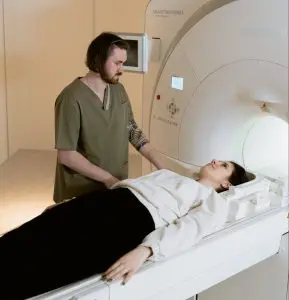
To be diagnosed with claustrophobia, a person will need to explain to their doctor that they have been having these intense feelings for a while and that they are having a negative impact on their lives. This could mean that they go out of their way to avoid certain places or situations. A mental health professional will try to determine whether these fears are normal, or could be attributed to some other condition.
Some doctors may prescribe SSRIs like Zoloft or Lexapro, which influence serotonin levels in the brain, to help patients who are suffering from claustrophobia or anxiety. Often therapy is recommended to help patients learn to cope with their feelings. Cognitive behavioral therapy (CBT) and/or exposure therapy aim to retrain the mind and may help people learn to get used to being in a small space without feeling so anxious.
Psychiatric medications can have unwanted side effects and may create a sense of dependence. Some people will avoid therapy because it can be very confronting and become another source of fear.
Acupuncture and other TCM modalities, including herbs and movement techniques like Tai Chi, may offer an alternative solution for panic attacks due to claustrophobia, without side effects or having to work through the problem with uncomfortable talk therapy sessions.
Can Acupuncture Help Claustrophobia?
According to TCM, the organ systems closely associated with fear are those of the kidneys, liver, and heart. Kidney deficiency, in particular, can cause fear and mental disturbances. These types of mental disorders can also be related to imbalances in Yin and Yang energies, and blood deficiencies. An acupuncture practitioner’s approach to treatment for claustrophobia may, therefore, focus on strengthening and nourishing the kidneys, while soothing the liver and heart.
One study compared patients who knew they had claustrophobic feelings going into an MRI; some were treated with acupuncture based on TCM acupoints. Control groups patients were given sham acupuncture (not really the points that would correspond with TCM theory). They concluded that the real acupuncture treatment did offer a therapeutic effect for claustrophobia, with a 92% rate of effectiveness; meaning, the patients were able to remain calm during the MRI.
A case study of a woman who had experienced bouts of claustrophobic symptoms since her teenage years, including shortness of breath, trembling, sweating, and loss of motor control in her hands and feet. After six acupuncture treatment sessions, she reported much improvement: feeling calmer, no headaches, palpitations, or anxiety. Chinese herbs can also be used, in conjunction with acupuncture treatment, help a person overcome claustrophobia.
Acupressure Points for Claustrophobia
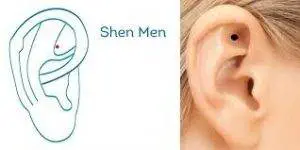
In between acupuncture sessions, you can use self-care acupressure to relieve claustrophobia.
Shen Men is a Master point, located in the valley of the upper part of the ear. This is a classic point to help feelings of anxiety.
Shoujie, which is located on the palm of the hand between the metacarpals of the fourth and fifth fingers, along the topmost crease, helps relieve palpitations and dizziness.
Acupuncture for Claustrophobia Near Me in Los Angeles Area
TCM is an excellent way for people to find relief from mental health issues of all kinds, including depression, anxiety, panic attacks, and phobias. We will do all we can to make sure that you are comfortable in one of our larger treatment rooms with a window, and to make your acupuncture treatment experience relaxing and pain-free. If you or someone you know is finding that the thought of enclosed spaces is creating anxiety in day-to-day life, please do not hesitate to try acupuncture for claustrophobia.
*This article is for education from the perspective of Traditional Chinese Medicine only. The education provided by this article is not approved by FDA to diagnose, prevent, treat and cure human diseases. It should not stop you from consulting with your physician for your medical conditions. Traditional Chinese Medicine is based on Qi, which is an invisible force that usually cannot be observed by modern science. Because science focuses on testing ideas about the natural world with evidence obtained through observation, these aspects of acupuncture can’t be studied by science. Therefore acupuncture and Chinese herbs are often not supported by double-blind, randomized trials, and they are considered alternative medicine therapies in the United States.